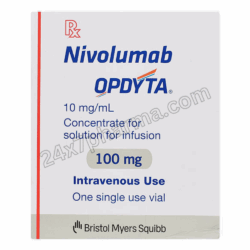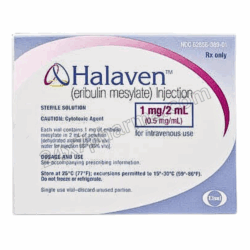LuciNira 100mg, Niraparib Capsules
LuciNira 100mg is a branded formulation of Niraparib, an oral anticancer drug belonging to the class of poly (ADP-ribose) polymerase (PARP) inhibitors. It is primarily used in the treatment of certain types of ovarian cancers and other gynecologic malignancies. Manufactured for targeted cancer therapy, LuciNira offers new hope to patients with recurrent or resistant forms of cancer, particularly those who have responded to previous platinum-based chemotherapy.
What is LuciNira 100mg (Niraparib)?
Niraparib, a PARP inhibitor intended to obstruct cancer cell repair processes, is present in LuciNira 100mg. PARP enzymes are critical in repairing DNA damage in cells. Niraparib targets cancer cells with deficient DNA repair pathways—such as those in BRCA-mutated tumors—making it harder for the tumor to survive. LuciNira is used as maintenance therapy and is prescribed after a positive response to chemotherapy.
Mechanism of Action
Niraparib inhibits the PARP-1 and PARP-2 enzymes, which play essential roles in the repair of single-strand DNA breaks through the base excision repair pathway. Inhibition of PARP leads to the accumulation of DNA damage and eventually causes cell death, especially in tumor cells that already have defective DNA repair mechanisms due to BRCA1/BRCA2 mutations or homologous recombination deficiency (HRD).
This synthetic lethality mechanism spares normal cells while targeting malignant ones, reducing the risk of toxicity typically seen in traditional chemotherapy.
How to Use / Indications
LuciNira 100mg is approved for the following indications:
- Adult patients with primary peritoneal, fallopian tube, or advanced epithelial ovarian cancer who are responding fully or partially to first-line platinum-based chemotherapy are treated with maintenance therapy.
- Maintenance treatment in patients with recurrent ovarian cancer responding to platinum-based chemotherapy, regardless of BRCA mutation status.
- treatment of patients with HRD-positive tumors who have had three or more previous chemotherapy treatments for advanced ovarian cancer.
How to Take / Dosage
Standard Dosage:
- The typical starting dose of LuciNira is 300 mg once daily, which equals 3 capsules of 100mg taken orally.
- The dose can be adjusted based on body weight and platelet count:
- 200 mg daily for patients weighing <77 kg or with platelet count <150,000/μL.
Administration Guidelines:
- Take at the same time each day, preferably in the evening.
- It can be taken with or without food.
- Swallow the capsule whole; do not chew, crush, or open.
- If a dose is missed, it can be taken within 12 hours; if more than 12 hours have passed, skip the dose and resume the next day.
Other Dosage Information
- Dose Adjustments: May be require in case of adverse effects like thrombocytopenia, neutropenia, or anemia.
- Reduced Dosage: For patients with moderate hepatic impairment, starting at a lower dose may be recommended.
- Discontinuation: Therapy may need to be discontinue in cases of persistent or severe toxicity despite dose modification.
Always follow your oncologist’s advice for dosage personalization.
Side Effects
Like all cancer therapies, LuciNira has potential side effects, some of which require medical intervention.
Common Side Effects:
- Nausea and vomiting
- Fatigue
- Constipation
- Loss of appetite
- Insomnia
- Dizziness
- Headache
Serious Side Effects:
- Thrombocytopenia (low platelet count)
- Anemia
- Neutropenia (low white blood cells)
- Hypertension
- Myelodysplastic syndrome (MDS) or acute myeloid leukemia (AML) (rare but serious)
- Monitoring: Regular blood tests are essential to monitor blood counts and manage adverse events.
Storage
- Store at room temperature (15°C–30°C).
- Keep the capsules in the original container to protect from moisture.
- Keep out of reach of children.
- Do not use beyond the expiry date printed on the packaging.
Benefits
- Targeted Therapy: Selectively attacks cancer cells while sparing normal tissues.
- Oral Convenience: Eliminates the need for hospital visits for IV therapy.
- Extended Remission: Maintains response after chemotherapy and delays recurrence.
- Effective in HRD and BRCA-mutated cancers: Even beneficial in some patients without BRCA mutations.
- LuciNira enhances quality of life by reducing cancer progression in eligible patients.
Prescription
LuciNira 100mg is a prescription-only medication and must be use under the supervision of a qualify oncologist. Regular monitoring and dose modifications are crucial to ensure safety and efficacy. Never self-medicate or share the medicine with others.
Drug Interactions
Although Niraparib is not extensively metabolize by liver enzymes, certain interactions should be considere:
Potential Interactions:
- ACE inhibitors/ARBs – may enhance the risk of anemia or thrombocytopenia.
- Drugs affecting blood pressure – as Niraparib may cause hypertension.
- Other myelosuppressive agents – may increase risk of severe bone marrow suppression.
Food Interaction:
No major food restrictions, but should be take consistently with or without meals.
Discuss all current medications with your doctor, including over-the-counter supplements and herbal remedies.
FAQs
Is LuciNira a form of chemotherapy?
No, LuciNira is a targete oral therapy known as a PARP inhibitor, not traditional chemotherapy.
Is it safe for long-term use?
LuciNira can be use long-term under medical supervision. Your doctor will monitor for side effects like anemia or MDS.
How fast does it work?
Niraparib does not shrink tumors but works to prevent cancer progression. It helps maintain remission following chemotherapy.
Conclusion
LuciNira 100mg (Niraparib) represents a critical advancement in personalized oncology care, especially for women battling ovarian and related cancers. As a PARP inhibitor, it works by exploiting the cancer cell’s own DNA repair weaknesses, offering a more selective and effective treatment approach with manageable side effects. While it offers the convenience of oral dosing and the advantage of targeted therapy, its use should be under strict medical guidance with routine blood monitoring. With its ability to significantly extend progression-free survival, LuciNira is a valuable asset in modern cancer treatment regimens.









